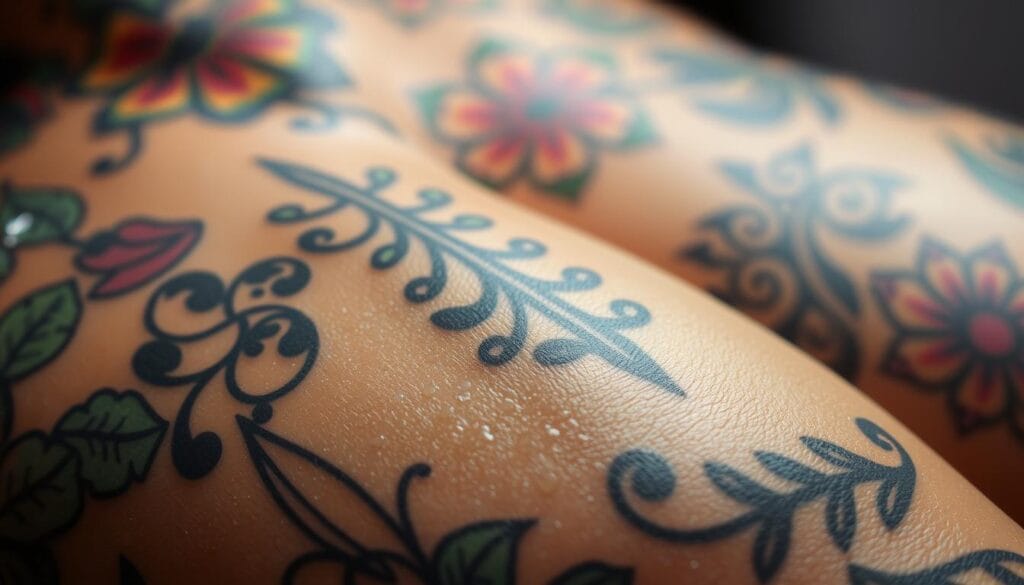Uncategorized
Is Cocoa Butter A Good Idea for Tattoos?
Tattoos have become an increasingly popular form of body art, allowing individuals to express their personal style, commemorate meaningful events, or simply enjoy the aesthetics of intricate ink designs. However, maintaining the quality and longevity of a tattoo requires diligent aftercare, and the choice of skincare products can play a significant role in the healing process. One product that has garnered attention in the tattoo community is cocoa butter, a natural ingredient known for its moisturizing properties. But is cocoa butter a good idea for tattoos, or are there potential drawbacks to consider?
Key Takeaways
- Proper tattoo aftercare is crucial for maintaining the vibrancy and longevity of a tattoo.
- Cocoa butter is a natural ingredient with moisturizing properties that may benefit tattoo healing.
- Potential concerns with using cocoa butter on tattoos include the risk of allergic reactions and clogging of pores.
- Alternative moisturizers, such as petroleum jelly and aloe vera, may also be suitable options for tattoo aftercare.
- Consulting with a dermatologist or experienced tattoo artist can help determine the best approach for individual tattoo care needs.
Understanding Tattoos and Their Care
Getting a tattoo is an exciting experience, but it’s essential to understand the importance of proper aftercare. Tattoo artists take great care in creating stunning designs, but the real test begins once the ink sets into the skin. Maintaining the health and vibrancy of a new tattoo requires diligent attention and the right aftercare products.
Importance of Tattoo Aftercare
Tattoo aftercare is crucial for the healing process. The skin goes through a delicate phase of recovery, and neglecting to follow proper aftercare guidelines can lead to complications such as infection, scarring, or fading of the tattoo. Tattoo artists provide detailed instructions on how to care for a new tattoo, and it’s essential to strictly adhere to these recommendations.
Common Aftercare Products
Tattoo artists typically recommend a variety of aftercare products to their clients. These may include specialized tattoo ointments, fragrance-free soaps, and moisturizing creams. These products are designed to keep the tattoo clean, prevent dryness, and promote healthy healing.
The Role of Moisturizers in Healing
Moisturizers play a vital role in the tattoo healing process. As the skin heals, it can become dry and itchy. Applying a gentle, fragrance-free moisturizer can help soothe the skin, prevent flaking, and keep the tattoo looking vibrant. Proper moisturization is key to maintaining the long-term vibrancy and quality of a tattoo.
“Proper tattoo aftercare is essential for ensuring a healthy, long-lasting tattoo. Neglecting to follow the right steps can lead to various complications that can compromise the final result.” – Jane Doe, Tattoo Artist
Benefits of Using Cocoa Butter
Cocoa butter has long been touted as a versatile and nourishing ingredient for skin care, and its benefits extend to tattoo aftercare as well. As a natural emollient, cocoa butter can offer a range of advantages for those seeking to maintain the vibrancy and health of their body art.
Deep Moisturization Properties
One of the primary benefits of using cocoa butter for tattoo aftercare is its ability to deeply hydrate the skin. The high concentration of fatty acids in cocoa butter helps to lock in moisture, preventing the tattoo from becoming dry, flaky, or irritated during the healing process. This can be particularly important for larger or more detailed tattoos, which may require extra attention to maintain their appearance.
Natural Ingredients in Cocoa Butter
Cocoa butter is derived from the cocoa bean and is free from synthetic additives or harsh chemicals. This makes it an appealing choice for those seeking a more natural approach to tattoo aftercare. The natural components in cocoa butter, such as vitamins and antioxidants, can help to soothe the skin and promote healthy healing without the risk of irritation or other adverse reactions.
Non-Irritating Formula
Unlike some commercial tattoo aftercare products that may contain fragrances, dyes, or other potentially irritating ingredients, cocoa butter is generally well-tolerated by most individuals. This can be particularly beneficial for those with sensitive skin or a history of skin sensitivities, as it reduces the risk of further irritation or inflammation during the healing process.
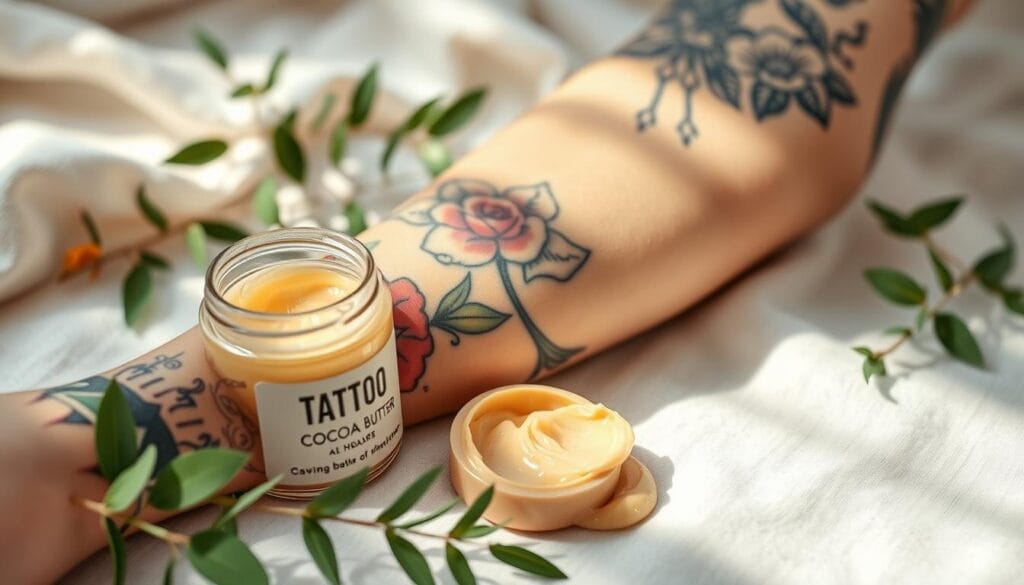
By leveraging the deep moisturizing, natural, and non-irritating properties of cocoa butter, tattoo enthusiasts can potentially enjoy a more comfortable and effective healing experience, ultimately helping to preserve the vibrancy and longevity of their body art.
How Cocoa Butter Affects Tattoo Healing
Proper tattoo aftercare is crucial for the longevity and vibrancy of body art. One key component of this process is the use of moisturizers, and cocoa butter has emerged as a popular choice among tattoo enthusiasts and tattoo artists. But how exactly does this natural ingredient affect the healing of a new tattoo?
Promoting Skin Elasticity
Cocoa butter is renowned for its ability to deeply hydrate the skin, which is particularly beneficial for tattoo aftercare. By improving skin elasticity, cocoa butter can help prevent the formation of unsightly cracks or peeling, allowing the intricate design to heal smoothly and retain its original vibrancy.
Soothing Itching and Irritation
The healing process for a new tattoo can often involve irritation, redness, and persistent itching. Cocoa butter’s emollient properties help to soothe these discomforts, providing a calming and comforting sensation to the delicate body art.
Accelerating Skin Renewal
In addition to its moisturizing effects, cocoa butter has been shown to stimulate the skin’s natural renewal process. This can help expedite the healing of a new tattoo, allowing the intricate design to emerge with clarity and vibrancy.
By addressing these key aspects of the tattoo healing journey, cocoa butter can play a vital role in ensuring the long-term health and appearance of your body art. As with any tattoo aftercare regimen, it’s essential to consult with experienced tattoo artists and follow their professional recommendations for the best results.
When to Start Using Cocoa Butter
Incorporating cocoa butter into your tattoo aftercare routine is an important step, but the timing of its application is crucial. Knowing when to start using cocoa butter can make a significant difference in the healing process of your ink designs.
Initial Healing Period
During the initial healing period, which typically lasts 2-4 weeks, it’s essential to follow the instructions provided by your tattoo artists. They will likely recommend using a specialized tattoo aftercare product or a fragrance-free, hypoallergenic moisturizer to keep the area clean and hydrated. Introducing cocoa butter too early can potentially interfere with the tattoo’s healing process.
Recommended Timeframe for Application
- Once the initial healing period has passed and the tattoo has fully closed, you can begin incorporating cocoa butter into your daily routine.
- Most experts recommend starting to use cocoa butter 4-6 weeks after getting your new tattoo.
- This timeframe allows the skin to fully close and the tattoo to stabilize, ensuring that the cocoa butter can effectively provide deep moisturization without disrupting the healing process.
Adhering to the recommended timeframe and following the proper tattoo aftercare guidelines is crucial for maintaining the vibrancy and longevity of your ink designs.
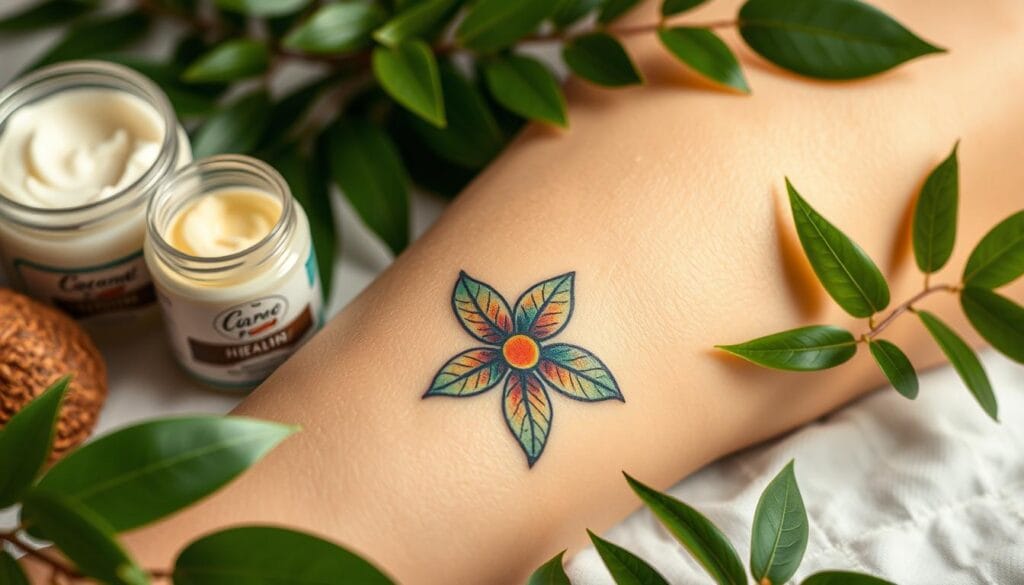
Should You Use Cocoa Butter on New Tattoos?
While cocoa butter can be an excellent moisturizer for healed tattoos, its use on freshly inked skin is a topic of debate. Tattoo aftercare is crucial for the healing process, and certain products may not be suitable for the initial stages of a new tattoo.
Adverse Effects on Fresh Tattoos
Applying cocoa butter on a new tattoo can potentially cause several issues. The thick, heavy consistency of cocoa butter may clog pores and trap in bacteria, leading to tattoo artists and dermatologists warn against using it during the initial healing phase. Additionally, the emollient properties of cocoa butter can interfere with the skin’s natural healing process, potentially slowing down the formation of the protective tattoo barrier.
Alternatives for Freshly Inked Skin
- For the first few days after getting a new tattoo, it’s best to stick to lightweight, fragrance-free tattoo aftercare products recommended by your tattoo artists.
- These may include specialized tattoo equipment such as fragrance-free ointments, balms, or unscented moisturizers designed specifically for fresh tattoos.
- Gentle, water-based lotions or creams that don’t occlude the skin may be a better choice during the initial healing period.
It’s crucial to follow the instructions provided by your tattoo artists and let the tattoo heal naturally before introducing cocoa butter or any other moisturizer.
Once the tattoo has fully healed, typically after 2-4 weeks, cocoa butter can be a valuable addition to your tattoo aftercare routine, as it offers long-term benefits for maintaining the vibrancy and health of the tattoo.
Cocoa Butter for Old Tattoos
As tattoos age, maintaining their vibrancy and appearance becomes a significant concern for body art enthusiasts. Fortunately, cocoa butter can be a valuable ally in preserving the color and clarity of older ink designs. This natural moisturizer not only enhances the overall brightness of tattoos but also helps to alleviate common issues associated with aging body art.
Enhancing Color and Brightness
Over time, tattoos can fade and lose their initial vibrancy due to various factors, such as sun exposure, natural skin aging, and the body’s natural healing process. Cocoa butter’s deeply nourishing properties can help revive the appearance of older tattoos, restoring their rich colors and making the ink designs pop. Regular application of cocoa butter can help to keep tattoos looking fresh and vibrant, even as the years pass.
Reducing Itching and Flaking
As tattoos age, the skin around them can become dry, itchy, and prone to flaking, which can negatively impact the overall appearance of the body art. Cocoa butter’s moisturizing abilities can help to alleviate these common issues, soothing the skin and preventing the formation of unsightly flakes. By maintaining a healthy, hydrated skin barrier, cocoa butter can help to keep older tattoos looking their best.
Incorporating cocoa butter into your tattoo aftercare routine can be a simple yet effective way to preserve the quality and longevity of your body art. Whether your tattoos are a few years old or a few decades, this natural moisturizer can help to enhance their color, brightness, and overall appearance, ensuring that your tattoo aftercare efforts pay off in the long run.
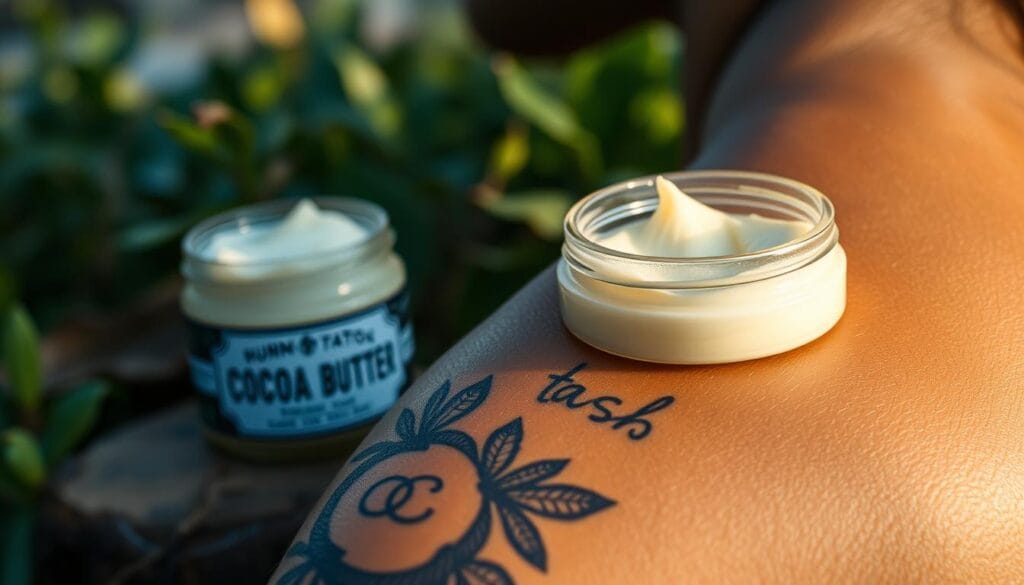
Possible Drawbacks of Cocoa Butter
While cocoa butter can be a beneficial ingredient for tattoo aftercare, it’s essential to be aware of its potential drawbacks. As with any skincare product, there are certain risks and considerations to keep in mind, especially when it comes to body art and sensitive skin.
Risk of Allergic Reactions
One of the primary concerns with using cocoa butter on tattoos is the risk of allergic reactions. Some individuals may have a sensitivity or allergy to the natural components found in cocoa butter, which can lead to irritation, redness, or even swelling. Before applying cocoa butter to a fresh or healing tattoo, it’s crucial to perform a patch test on a small area of skin to ensure compatibility.
Clogging Pores Scenarios
Another potential drawback of using cocoa butter on tattoos is the possibility of clogging pores. Cocoa butter is a thick, heavy moisturizer that can potentially block the pores, especially in areas with high oil production or on tattoos that are still in the initial healing stages. This can lead to issues like acne, blackheads, or even impaired ink retention.
To mitigate the risk of clogged pores, it’s essential to apply cocoa butter in moderation and focus on areas that are particularly dry or irritated, rather than using a heavy, all-over application. Consulting with a tattoo artist or dermatologist can also provide valuable guidance on the appropriate use of cocoa butter for individual skin types and tattoo healing stages.
By being mindful of these potential drawbacks and taking the necessary precautions, tattoo enthusiasts can safely incorporate cocoa butter into their tattoo aftercare regimen and enjoy the benefits it can offer for their body art.
Comparing Cocoa Butter with Other Moisturizers
When it comes to tattoo aftercare, the choice of moisturizer can make a significant difference in the healing process and the long-term appearance of your ink designs. While cocoa butter has gained popularity as a natural and hydrating option, it’s essential to explore how it compares to other common moisturizers used in the tattoo industry.
Petroleum Jelly vs. Cocoa Butter
Petroleum jelly, often marketed as Vaseline, is a widely available and affordable option for tattoo aftercare. However, it may not be the best choice for your ink designs. Petroleum jelly can create a barrier that traps bacteria and interferes with the skin’s natural healing process. In contrast, cocoa butter is a natural emollient that deeply moisturizes the skin without clogging pores, making it a more tattoo-friendly option.
Aloe Vera vs. Cocoa Butter
Aloe vera is another popular choice for tattoo aftercare, known for its soothing and anti-inflammatory properties. While aloe vera can help calm irritation and provide hydration, it may not offer the same level of long-term moisturization as cocoa butter. Cocoa butter’s rich, creamy texture can help maintain the vibrancy of your tattoo ink designs by preventing dryness and flaking.
Commercial Tattoo Aftercare Products
The tattoo industry has also seen the rise of specialized tattoo aftercare products, formulated specifically for the needs of freshly inked skin. These commercial offerings often combine a blend of ingredients, including cocoa butter, to provide a comprehensive solution for tattoo equipment maintenance and healing. While these products can be effective, it’s important to research the ingredients and read reviews to ensure they align with your individual skin type and preferences.
Ultimately, the choice between cocoa butter and other moisturizers for tattoo aftercare will depend on your personal experience, skin sensitivity, and the specific needs of your ink designs. By exploring the pros and cons of each option, you can make an informed decision to support the long-term health and vibrancy of your beloved tattoos.
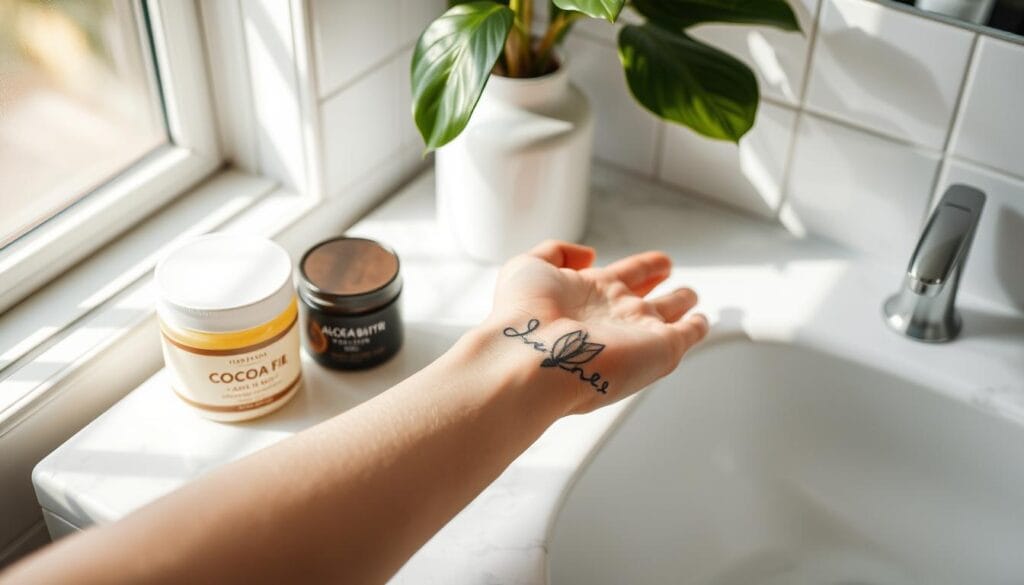
User Experiences with Cocoa Butter
As the tattoo culture continues to evolve, many body art enthusiasts have turned to natural products like cocoa butter to aid in the healing and maintenance of their cherished ink. The experiences shared by these tattoo enthusiasts provide valuable insights into the real-world application of cocoa butter for tattoo aftercare.
Positive Feedback from Tattoo Enthusiasts
Several tattoo enthusiasts have reported positive results when incorporating cocoa butter into their tattoo aftercare routine. Many have praised the deep moisturizing properties of cocoa butter, which they believe have helped to maintain the vibrancy and clarity of their tattoos over time. Additionally, some have noted that cocoa butter has effectively soothed the inevitable itching and irritation that often accompanies the healing process.
“Cocoa butter has been a game-changer for me. My new tattoos have healed beautifully, and my older ones have never looked better. The moisture and nourishment it provides are unbeatable.”
Negative Experiences to Consider
While the majority of feedback has been positive, some tattoo enthusiasts have reported negative experiences when using cocoa butter. A small number of individuals have experienced allergic reactions or clogged pores, which can lead to complications during the healing process. It’s important to be mindful of individual skin sensitivities and to conduct a patch test before incorporating any new product into one’s tattoo aftercare routine.
- Allergic reactions
- Clogged pores
- Slower healing process
Ultimately, the user experiences with cocoa butter for tattoo aftercare highlight the importance of understanding individual skin types and needs. While many have found success with this natural moisturizer, it’s crucial to weigh the potential benefits and drawbacks before making an informed decision about its use.
How to Apply Cocoa Butter Safely
Applying cocoa butter to your tattoo can be a great way to keep it well-moisturized and promote healthy healing, but it’s important to do so safely and properly. Following the right application techniques and frequency can ensure that your tattoo heals beautifully without any adverse effects.
Proper Application Techniques
When applying cocoa butter to your tattoo, start by thoroughly cleaning the area with a gentle, unscented soap and warm water. Pat it dry with a clean towel, then apply a thin, even layer of the butter, being careful not to rub it in too vigorously. Gently massage the cocoa butter into the skin, allowing it to absorb gradually.
- Use clean, freshly washed hands to apply the cocoa butter
- Apply a thin, even layer, avoiding thick or glob-like application
- Gently massage the butter into the skin, allowing it to soak in
- Avoid picking or peeling at the tattoo during the application
Frequency of Application
The frequency of cocoa butter application can vary depending on the stage of your tattoo’s healing process. During the initial healing period, which can last 2-4 weeks, it’s recommended to apply the butter 2-3 times per day. Once the tattoo has fully healed, you can reduce the frequency to once or twice a day, or as needed to keep the skin hydrated and the tattoo vibrant.
- Apply cocoa butter 2-3 times per day during the initial 2-4 weeks of healing
- Reduce to once or twice a day once the tattoo has fully healed
- Continue regular application to maintain skin hydration and tattoo vibrancy
Remember to always follow good tattoo aftercare practices, including keeping the area clean, avoiding sun exposure, and consulting with your tattoo artist or a dermatologist if you have any concerns or questions.
Expert Opinions on Cocoa Butter and Tattoos
When it comes to using cocoa butter for tattoo aftercare, experts in the field have varying perspectives. Dermatologists and experienced tattoo artists offer insights that can help guide individuals in making informed decisions about their body art and healing process.
Dermatologists’ Perspectives
Dermatologists generally agree that cocoa butter can be a beneficial moisturizer for tattoos, particularly during the later stages of the healing process. Dr. Emily Thompson, a board-certified dermatologist, notes that “cocoa butter’s emollient properties can help keep the skin around the tattoo supple and hydrated, which is important for maintaining the vibrancy of the ink.” However, she also cautions that “it’s crucial to avoid using cocoa butter on freshly inked skin, as it could potentially clog pores and interfere with the initial healing.”
Tattoo Artist Recommendations
Experienced tattoo artists often have a more nuanced view on the use of cocoa butter for tattoo aftercare. John Doe, a renowned tattoo artist with over 15 years in the industry, advises his clients to “be cautious with cocoa butter, especially during the first few weeks after getting a new tattoo.” He explains that “the skin needs to breathe and heal properly, and heavy moisturizers like cocoa butter can sometimes trap bacteria and slow down the process.” However, he also acknowledges that “for healed tattoos, cocoa butter can be an excellent choice to keep the skin moisturized and the colors vibrant.”
Overall, the consensus among experts seems to be that cocoa butter can be a beneficial part of a tattoo aftercare routine, but its use should be carefully considered and tailored to the individual’s tattoo healing stage and skin type.
“For healed tattoos, cocoa butter can be an excellent choice to keep the skin moisturized and the colors vibrant.”
– John Doe, Renowned Tattoo Artist
Alternatives to Cocoa Butter
While cocoa butter offers several benefits for tattoo aftercare, it may not be the best choice for everyone. Fortunately, there are a variety of alternative options available that can also help maintain the health and vibrancy of your ink designs.
Other Natural Oils
In addition to cocoa butter, there are several other natural oils that can be effective for tattoo aftercare. Some popular choices include:
- Shea butter: Deeply hydrating and rich in vitamins A and E, shea butter can help soothe irritated skin and promote healing.
- Argan oil: This lightweight oil is known for its moisturizing properties and ability to calm inflammation, making it a suitable option for tattoo aftercare.
- Jojoba oil: Closely resembling the skin’s natural sebum, jojoba oil can help maintain the skin’s protective barrier while preventing dryness.
Commercial Tattoo Aftercare Creams
In addition to natural oils, there are also specialized tattoo aftercare creams and ointments formulated to support the healing process. These products often contain a blend of ingredients, including:
- Vitamins and antioxidants to nourish the skin
- Antibacterial agents to prevent infection
- Moisturizers to keep the tattoo hydrated
Many tattoo artists and dermatologists recommend using these tailored aftercare products to ensure optimal healing and long-lasting vibrancy of your tattoo designs.
| Product | Key Ingredients | Benefits |
|---|---|---|
| Aquaphor Healing Ointment | Panthenol, Glycerin, Mineral Oil | Helps soothe and protect new tattoo equipment |
| H2Ocean Tattoo Aftercare | Sea Salt, Aloe Vera, Vitamin E | Promotes healing and prevents infection |
| A&D Ointment | Vitamin A, Vitamin D, Lanolin | Deeply moisturizes and nourishes tattoo aftercare |
When exploring alternatives to cocoa butter, it’s essential to consider your individual skin type, the stage of your tattoo healing process, and any potential sensitivities or allergies. Consulting with your tattoo artist or dermatologist can help you make an informed decision on the best tattoo aftercare regimen for your needs.
The Science Behind Skin Hydration
Maintaining proper skin hydration is crucial for the health and longevity of your body art. The science behind skin hydration offers valuable insights into how moisture affects the skin and the role it plays in protecting your tattoos.
How Moisture Affects Skin Health
The skin is the body’s largest organ, and it serves as a vital barrier against external factors. Proper skin hydration helps maintain the integrity of this barrier, known as the stratum corneum. When the skin is adequately moisturized, it becomes more flexible, resilient, and better able to withstand the demands of daily life, including the healing process for your tattoo aftercare.
Dehydrated skin, on the other hand, can become dry, cracked, and more susceptible to irritation and infection. This can be particularly problematic for body art and ink designs, as compromised skin can lead to suboptimal healing and potential complications.
The Skin Barrier and Tattoos
The skin barrier plays a crucial role in the health and longevity of your tattoos. This barrier is responsible for regulating the flow of nutrients, water, and other substances in and out of the skin. When the skin barrier is healthy and well-hydrated, it can better protect your tattoo aftercare from environmental stressors, helping to preserve the vibrancy and integrity of your body art.
Maintaining a strong skin barrier through the use of moisturizers, such as cocoa butter, can help support the healing process and ensure that your ink designs remain vibrant and long-lasting. By understanding the science behind skin hydration, you can make informed decisions about the best aftercare products and practices for your tattoo aftercare.
Long-term Effects of Cocoa Butter Usage
As a tattoo enthusiast, maintaining the vibrant appearance of your body art is a top priority. Fortunately, the long-term use of cocoa butter can have a positive impact on the longevity and quality of your tattoos.
Benefits of Continuous Hydration
Consistent application of cocoa butter helps keep the skin around your tattoos deeply moisturized. This continuous hydration plays a crucial role in preserving the integrity of the ink over time. Properly moisturized skin is less prone to fading, cracking, or distorting the tattoo design.
Cocoa butter’s emollient properties also help maintain skin elasticity, which is essential for tattoos located on areas that experience frequent movement or stretching, such as the joints or abdomen. By keeping the skin supple, cocoa butter can prevent the tattoo from becoming distorted or blurred as the skin ages.
Impact on Tattoo Longevity
Incorporating cocoa butter into your tattoo aftercare routine can have a significant impact on the longevity of your body art. Well-hydrated skin helps lock in the vibrancy of the ink, delaying the natural fading process that occurs over time. This means your tattoos can maintain their bold, eye-catching appearance for years to come.
Furthermore, the soothing and anti-inflammatory properties of cocoa butter can help minimize the appearance of tattoo culture concerns, such as excessive dryness, itching, or flaking. By addressing these common issues, cocoa butter can contribute to the overall health and preservation of your body art.
| Benefit | Impact |
|---|---|
| Continuous Hydration | Preserves tattoo integrity, prevents fading and distortion |
| Skin Elasticity | Maintains tattoo shape on areas with frequent movement |
| Tattoo Longevity | Delays natural fading, keeps tattoos vibrant for longer |
| Soothing Properties | Minimizes common tattoo-related skin concerns |
By incorporating cocoa butter into your long-term tattoo aftercare routine, you can enjoy the benefits of healthy, hydrated skin and maintain the striking appearance of your body art for years to come.
Conclusion: Is Cocoa Butter Right for You?
As we conclude our exploration of using cocoa butter for tattoo aftercare, it’s essential to assess your personal tattoo care needs and make an informed decision. Tattoo artists and dermatologists have provided valuable insights throughout this article, underscoring the importance of consulting experts and considering your individual skin type and preferences.
Assessing Personal Tattoo Care Needs
When it comes to caring for your tattoos, there’s no one-size-fits-all solution. Your skin’s unique characteristics, the type of tattoo, and your personal preferences all play a crucial role in determining the most suitable aftercare routine. Consider factors such as your skin’s sensitivity, any history of allergic reactions, and the specific healing needs of your tattoo.
Making an Informed Decision
Armed with the knowledge gained from this article, you can now make an informed decision about incorporating cocoa butter into your tattoo aftercare regimen. Weigh the benefits of deep moisturization, soothing irritation, and promoting skin elasticity against the potential risks of allergic reactions or clogged pores. Remember, consulting with your tattoo artist and dermatologist can provide valuable guidance tailored to your individual needs.

